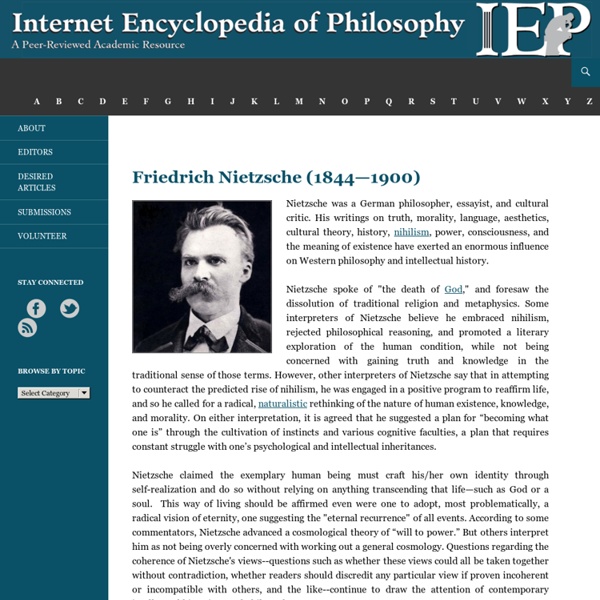Friedrich Nietzsche - German Philosopher
Friedrich Nietzsche (1844–1900) Nietzsche was born in Röcken, the Prussian province of Saxony, on October 15th, 1844. His father died when Nietzsche was five years old, hence, his childhood was spent with his mother, sister and two maiden aunts. Although Nietzsche served in the army in 1868 his appointment was cut short by illness. It was in Basel that Nietzsche became a close friend of Richard Wagner, the second part of The Birth of Tragedy is devoted to Wagner's music. Nietzsche encountered more adversities in his life, the rejection of Lou Andreas-Salomé to his proposal of marriage, along with his ongoing resistance to Prussian citizenship (which he had given up in 1869), provoked a withdrawal of Nietzsche. In his first published book, Die Geburt der Tragödie aus dem Geist der Musik (The Birth of Tragedy), he diagnosed that human beings are subject to Dionysian instincts — unconscious desires, impulses, or overwhelmingly self-destructive tendencies.
God is dead Friedrich Nietzsche death of God quotes
Friedrich Nietzsche is notable for having declared that God is dead and for having written several of his works in the presumption that man must find a new mode of being given the death of God. Perhaps the most interesting quote on this theme appears in his The Gay Science ( aka Joyous Wisdom). A fairly full version of this key ~ Parable of the Madman ~ quote is set out immediately below:- The Parable of the Madman Have you not heard of that madman who lit a lantern in the bright morning hours, ran to the market-place, and cried incessantly: "I am looking for God! What Nietzsche is concerned about in relating the above is that God is dead in the hearts and minds of his own generation of modern men - killed by an indifference that was itself directly related to a pronounced cultural shift away from faith and towards rationalism and science. What are we now to do? "I teach you the overman. Nietzsche Thus spoke Zarathustra "Companions, the creator seeks, not corpses, not herds and believers.
Friedrich Nietzsche
The Utter Failure of the 19th/20th Century Atheistic Icons Friedrich Nietzsche (1844 - 1900) (Printer-friendly version here - no inset articles, white background) (This is a CSS-enabled article. His Background Friedrich Nietzsche was born on October 15, 1844, in Rocken, Prussia. He studied classical philology at the universities of Bonn and Leipzig and was appointed professor of classical philology at the University of Basel at the age of only 24. Nietzsche was interested in the philosophies of Plato and Aristotle and influenced by German philosopher Arthur Schopenhauer, but one of his strongest influences was Darwin's Theory of Evolution which he wholeheartedly accepted. "...I call Christianity the one great curse, the one enormous and innermost perversion..." His Theories Friedrich Nietzsche challenged the foundations of traditional morality and of Christianity. Friedrich Nietzsche in 1864. His General Influence The goal of life should be to find yourself. Friedrich Nietzsche in 1882.
Friedrich Nietzsche
1. Life: 1844–1900 In the small German village of Röcken bei Lützen, located in a rural farmland area southwest of Leipzig, Friedrich Wilhelm Nietzsche was born at approximately 10:00 a.m. on October 15, 1844. Nietzsche's uncle and grandfathers were also Lutheran ministers, and his paternal grandfather, Friedrich August Ludwig Nietzsche (1756–1826), was further distinguished as a Protestant scholar, one of whose books (1796) affirmed the “everlasting survival of Christianity.” When Nietzsche was nearly 5 years old, his father, Karl Ludwig Nietzsche (1813–1849) died from a brain ailment (July 30, 1849) and the death of Nietzsche's two-year-old brother, Ludwig Joseph, traumatically followed six months later (January 4, 1850). From the ages of 14 to 19 (1858–1864), Nietzsche attended a first-rate boarding school, Schulpforta, located about 4km from his home in Naumburg, where he prepared for university studies. 2. 3. In Daybreak: Reflections on Moral Prejudices (Morgenröte. 4. 5. 6. 7.



